The Mahabharata is one of the two major Sanskrit epics of ancient India, the other being the Ramayana.
Contents
Mahabharata or Mahabharat may also refer to:
The Mahabharata is one of the two major Sanskrit epics of ancient India, the other being the Ramayana.
Mahabharata or Mahabharat may also refer to:

The Mahābhārata is one of the two major Smriti texts and Sanskrit epics of ancient India revered in Hinduism, the other being the Rāmāyaṇa. It narrates the events and aftermath of the Kurukshetra War, a war of succession between two groups of princely cousins, the Kauravas and the Pāṇḍavas.

The Ramayana, also known as Valmiki Ramayana, as traditionally attributed to Valmiki, is a smriti text from ancient India, one of the two important epics of Hinduism known as the Itihasas, the other being the Mahabharata. The epic narrates the life of Rama, a prince of Ayodhya in the kingdom of Kosala. The epic follows his fourteen-year exile to the forest urged by his father King Dasharatha, on the request of Rama's stepmother Kaikeyi; his travels across forests in the Indian subcontinent with his wife Sita and brother Lakshmana; the kidnapping of Sita by Ravana, the king of Lanka, that resulted in war; and Rama's eventual return to Ayodhya along with Sita to be crowned king amidst jubilation and celebration.
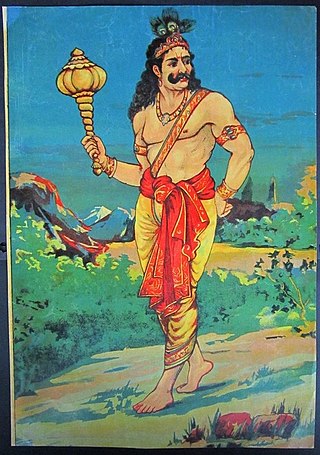
In the Hindu epic Mahabharata, Bhima is the second among the five Pandavas. The Mahabharata relates many events that portray the might of the hero Bhima. Bhima was born when Vayu, the wind god, granted a son to Kunti and Pandu. After the death of Pandu and Madri, Kunti with her sons stayed in Hastinapura. From his childhood, Bhima had a rivalry with his cousins Kauravas, especially Duryodhana. Duryodhana and his uncle, Shakuni, tried to kill Bhima multiple times. One was by poisoning and throwing Bhima into a river. Bhima was rescued by Nāgas and was given a drink which made him very strong and immune to all venom.
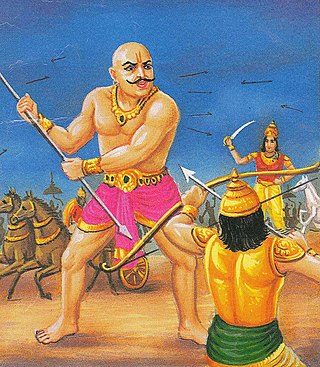
Ghatotkacha is a prominent character in the story of Mahabharata. His name comes from the fact that his head was hairless (utkacha) and shaped like a ghatam, or a pot. Ghatotkacha was the son of the Pandava Bhima and the demoness Hidimbi, and thus a half-human, half-demon hybrid.
Indian epic poetry is the epic poetry written in the Indian subcontinent, traditionally called Kavya. The Ramayana and the Mahabharata, which were originally composed in Sanskrit and later translated into many other Indian languages, and the Five Great Epics of Tamil literature and Sangam literature are some of the oldest surviving epic poems ever written.
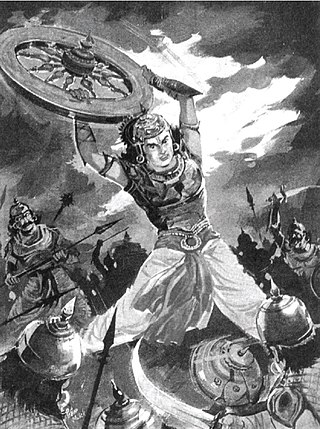
Abhimanyu is a warrior in the Hindu epic Mahabharata. He was the son of Arjuna and Subhadra, the younger sister of Krishna. Abhimanyu is portrayed as a young, strong and talented warrior. He was also one of the few individuals, along with his father, who knew the technique to enter the Chakravyuha, a powerful military formation.

Randamoozham is a 1984 Indian Malayalam-language mythological drama novel written by the Indian author M. T. Vasudevan Nair, widely credited as his masterpiece. The work won the Vayalar Award, given for the best literary work in Malayalam, in 1985. It also won the Muttathu Varkey Award in 1994. The novel has been translated into multiple languages. It was translated into English as Second Turn by P. K. Ravindranath in 1997. Another English translation by Gita Krishnankutty published in 2013 is titled Bhima: Lone Warrior.
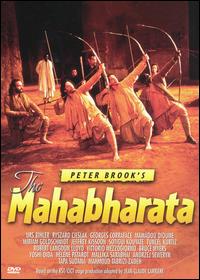
The Mahabharata is a 1989 film version of the Hindu epic Mahabharata directed by Peter Brook. Brook's original 1985 stage play was 9 hours long, and toured around the world for four years. In 1989, it was reduced to under 6 hours for television. Later it was also reduced to about 3 hours for theatrical and DVD release. The screenplay was the result of eight years' work by Peter Brook, Jean-Claude Carrière and Marie-Hélène Estienne.

Puneet Issar is an Indian actor, writer, director, producer and dialect coach best known for his works in Hindi films and television shows. Issar started his acting career as a villain in Manmohan Desai's 1983 film Coolie, but gained recognition with the portrayal of Duryodhana in B. R. Chopra's television series Mahabharat (1988–1990).

Nartanasala is a 1963 Indian Telugu-language Hindu mythological film directed by Kamalakara Kameswara Rao and written by Samudrala Sr. It stars N. T. Rama Rao, Savitri, S. V. Ranga Rao, and Relangi while Mukkamala, Mikkilineni and Dandamudi Rajagopal play supporting roles among others. Susarla Dakshinamurthi composed the film's soundtrack and background score. M. A. Rahman and S. P. S. Veerappa served as the cinematographer and editor respectively. T. V. S. Sarma was the film's art director. The film was produced by actress C. Lakshmi Rajyam and her husband C. Sridhar Rao under the Rajyam Pictures banner.
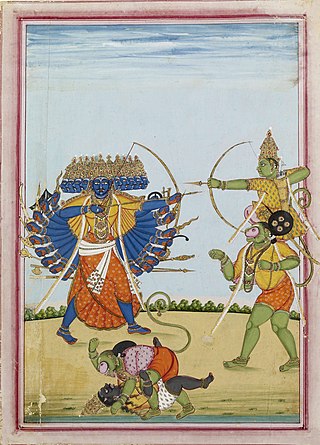
Depending on the methods of counting, as many as three hundred versions of the Indian Hindu epic poem, the Ramayana, are known to exist. The oldest version is generally recognized to be the Sanskrit version attributed to the sage Narada, the Mula Ramayana. Narada passed on the knowledge to Valmiki, who authored Valmiki Ramayana, the present oldest available version of Ramayana.

Kahaani Hamaaray Mahaabhaarat Ki is an Indian mythological television drama series on 9X based on the Sanskrit epic Mahabharata.

Chandraprakash Dwivedi is an Indian actor, film director and screenwriter, who is best known for directing the 1991 television epic Chanakya in which he also played the title role of the political strategist Chanakya and an inspiration for millions. He has also directed the 1996 television series Mrityunjay which is based on the life of Karna, one of the main characters of the epic Mahabharata, for which he won a Screen Videocon Best Director award. His other major work is the 2003 film Pinjar, a tragic love story set amidst the Hindu-Muslim tensions during the Partition of India, based on Amrita Pritam's novel of the same name. He also wrote and directed Akshay Kumar-starrer Samrat Prithviraj (2022). He was honoured by the Government of India with the Padma Shri, the fourth-highest civilian honour of the country, in 2022.

The Mahabharata: A Shortened Modern Prose Version of the Indian Epic is a mythological book by R. K. Narayan. It is a modernised, shortened, and translated retelling of The Mahabharata. It was first published by Heinemann, London in 1978. The book was published as a result of a long endeavour that included three Hindu mythological works, Gods, Demons and Others, The Ramayana and finally The Mahabharata; in 1995, these works were republished as part of a new book, The Indian Epics Retold.
Ramayana is one of the two major Sanskrit epics of ancient India.
Kamalakara Kameswara Rao was an Indian film director known for his works predominantly in Telugu cinema, and a few Tamil and Hindi films. Widely known as Pauranika Chitra Brahma, Kameswara Rao directed fifty feature films in a variety of genres.

Mahabharata is a comic adaptation of the Indian epic poem Mahabharata. The 42-issue best-selling series by Amar Chitra Katha, Mumbai was illustrated by Dilip Kadam. The team of script writers included Kamala Chandrakant, TMP Nedungadi, Subba Rao, Yagya Sharma, Lopamudra, Mihir Lal Mitra, Sumona Roy, Mohan Swaminathan, Shubha Kandhekar and Margie Sastry.

Mahabharat is a 2013 Indian mythological television series based on the Sanskrit epic Mahabharata. It aired from 16 September 2013 to 16 August 2014 on Star Plus. The series is available digitally on Disney+ Hotstar. Produced by Swastik Productions Pvt. Ltd, it starred Saurabh Raj Jain, Pooja Sharma, Shaheer Sheikh and Aham Sharma.

Epic TV is an Indian television channel that airs action, drama, comedy and narrative non-fiction and fictional programming with a focus on Indian history, folklore and epic genre. Launched by IN10 Media Network on 19 November 2014, a company owned by Anand Mahindra, it airs programmes in Hindi and English. Aditya Pittie, CEO of Pittie Group is the Managing Director of Epic TV.
Shakuntala is character from the Hindu epic Mahabharata.